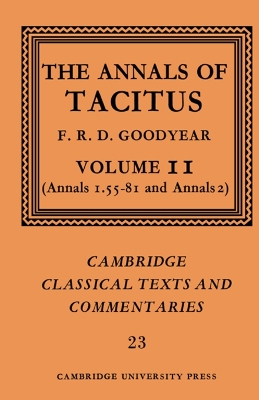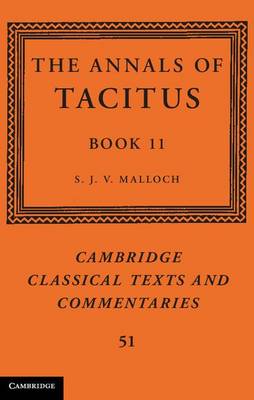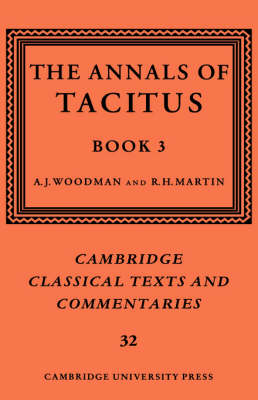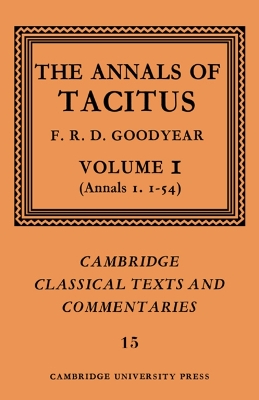Cambridge Classical Texts and Commentaries
4 total works
The Annals of Tacitus: Volume 2, Annals 1.55-81 and Annals 2
by Cornelius Tacitus
Published 28 May 1981
This book is the second volume of one of Professor Goodyear's greatest works of Latin literature and one of the most important sources for the history of the Roman Empire. His edition is accompanied by a major commentary which deals fully with textual, linguistic, literary, and historical matters. Every question is examined afresh. The discussion ranges widely, but not loosely. It is the editor's aim to explain Tacitus as a whole, not just particular features of his writing. The task he has undertaken is very large for there is a vast amount which needs explanation in the subject-matter and in its presentation. The results should benefit students of Latin literature and Roman history equally.
Book 11, the first of the later books of the Annals to survive, narrates two years in the reign of Claudius, AD 47-8. While Claudius is busy with the duties of his censorship, his wife Messalina is having a very public love affair with the young aristocrat Silius that eventually ruins her. In a book that also treats German, eastern, and other Roman internal affairs, a third of the surviving narrative is devoted to the destruction of Messalina. Here we encounter the classic portrayal of a Claudius ignorant and manipulated by those around him in an extended narrative that shows Tacitus at his dramatic and cynical best. This edition of Book 11, the first scholarly one in English in over a hundred years, contains a full introduction, a newly-edited Latin text with apparatus, and a comprehensive commentary that illuminates historical, historiographical, textual, linguistic, and literary issues that arise from the narrative.
Books 1 and 2 of Tacitus' Annals were edited and annotated in two earlier volumes of this series (1972 and 1981) by the late F. R. D. Goodyear. Now A. J. Woodman and R. H. Martin have added a third volume: Book 3 of the Annals. This book covers the years AD 20-22, including the aftermath of Germanicus' death and the trial of his alleged murderer Calpurnius Piso and contains some of Tacitus' most well known and important programmatic and reflective passages. In their commentary the editors are the first to attempt a systematic comparison of the documentary record provided by a recently discovered senatus consultum relating to Piso's trial with Tacitus' narrative of the same episode. More attention is given to literary matters than by Goodyear but textual, linguistic and historical issues are treated fully and new interpretations frequently offered.
The first in a four-volume edition of Tacitus Annals 1-6. The Annals are Tacitus' brilliant account of Roman imperial history from the death of Augustus to the death of Nero. Books 1-6 describe the reign of Tiberius. Professor Goodyear's introduction to the series deals concisely with the background to the Annals. He outlines the history of Tacitean scholarship to the present day and shows how Tacitus' historical judgements were sometimes distorted by his preoccupations with style and with the moral function of historical writing. The commentary attends equally to literary, historical and textual questions. There are several appendixes on topics of more specialized interest.



